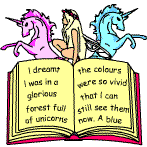Literary Picnic: The Brothers Grimm
Created | Updated Dec 20, 2012

It is funny, the coincidences which occur at times. When Dmitri suggested the Mongolian Tales from the archives for this edition, I didn't immediately see the connection to what I was about to do on Saturday. I only realised on rereading it on Sunday evening.
The Brothers Grimm
You'll all have heard of the Brothers Grimm, and that they collected fairy tales. What is less known, is that they did a lot more than that, as I was to find out during this year's literary picnic.
Mrs S, the owner of our local book store organises a 'Literary Picnic' once a year1, which is held on a Saturday close to summer solstice on 21 June. The theme is always something in connection with literature, and we in Hesse are lucky, because Hesse boasts a lot of former and present authors. This year, we went to Steinau an der Straße, where the Brothers Grimm spent their infancy. We visited the house they lived in, which is now a small museum, as well as the barn just across the yard which is also a small museum and shows contemporary things of the time.
We were told the origin of various expressions which are still used today, but it would be a little difficult to explain them in English, and anyway, it would all be lost in translation. Sometimes, I really regret that not as many native English speakers speak German as vice versa. There are so many things I'd love to share, but can't.
Well, at least there are things I can share, like what I learned about the Grimms on Saturday. Not only did they collect fairy tales, but they also started to write a German dictionary. They never finished it, it was finished a good century later. Jacob and Wilhelm were professors of the German language, they were the first to do philology. I found a claim that the English Oxford Dictionary was compiled after the model of the Grimm's Deutsches Wörterbuch.
Jacob and Wilhelm were lucky. When their father still lived, the family was well-off. However, he died in his early 40s, leaving his wife and six children with no means of income. If it hadn't been for their mother's sister, who worked at the court of the Prince of Kassel and sent them money as well as paying for J's and W's education (they visited a lyceum in Kassel), we'd probably not have the collection of fairy tales which made them so famous.
Not much is known about two of the other brothers, except that one of them died young, and far from home. The youngest brother, Ludwig Emil Grimm, was a gifted artist and drew all the portraits of his brothers2, the best known probably being the one that once featured on the DM 1,000 note. The sister, who was the youngest and much loved by all her brothers, was her eldest brothers' housekeeper for a while, until she married. This prompted Jacob to suggest Wilhelm should marry so that they'd have a housekeeper again. And Wilhelm obliged – as did his wife, who managed the household until the brothers' deaths.
We didn't only get a guided tour through the museum, but Mrs S had also hired a narrator, who told us a few of the (to me) unknown pieces the Grimms had collected. In between events we were offered Apfelstreusel (apple cake) and mineral water. After we had learned all about the Grimms, we went to have the picnic, which, due to the weather, was taken in a rented room. With more than 80 attendees, it was quite crammed, but we still had fun and laughed a lot. The picnic was rustic: bread, spreads, pickled cucumbers and meat loafs – and not a fork in sight. After we had eaten, the narrator told us one last story, but not from the Grimms. It was a Norwegian fairy tale, one of many collected, written down and published by the Norwegian Jørgen Engebretsen Moe, who, together with Peter Christen Asbjørnsen, virtually saved the Norwegian written language. Due to the 'Kingdom of Denmark', which lasted from 15363 until 1841, the administration and official language were Danish, meaning hardly anything was written in Norwegian for centuries. The Norske Folkeeventyr were published between 1841 and 1844.
Thus ended a marvellous day, which, at €25 per person was definitely worth the money.
